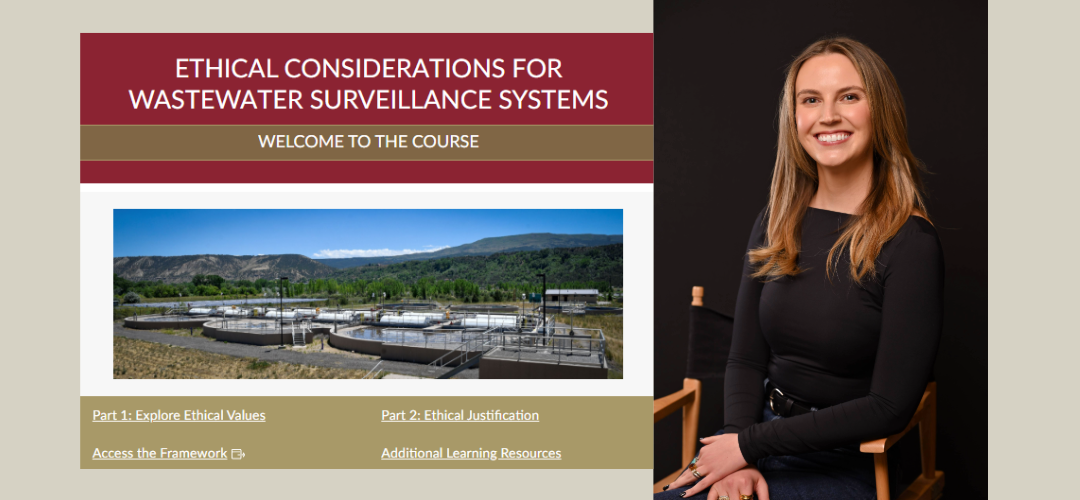When Kayley Podruski signed up for graduate school, she didn’t expect her coursework to land her in the middle of a national public health initiative. But that’s exactly what happened.
As part of the University of Denver’s Instructional Design and Technology (IDT) master’s program, Podruski was tapped to serve as the instructional design intern for a new wastewater surveillance ethics course that is now available to professionals across the country.
“It was definitely a crash course in wastewater surveillance,” Podruski said with a laugh. “When I came into the project, I didn’t know much about the topic. But I saw it as a great opportunity to test what I was learning about course design in a completely new context.”
From K–12 Education to Adult Learning
Podruski began her career in K–12 education before moving into corporate training. While she quickly gained experience in sales enablement, she wanted a stronger foundation in instructional design to expand her career options.
“I had a sort of roundabout path into the field,” she explained. “I realized I needed to upskill and deepen my knowledge in instructional design.”
DU’s Instructional Design & Technology program appealed to her because of its focus on adult learners and its emphasis on evidence-based design.
“I liked the analytical approach to design: learning to consider why I was making certain choices, not just doing what felt right,” she said.
A Real-World Challenge
By the time the wastewater project came along, Podruski was well into her degree program and ready for a challenge. Wastewater surveillance is a relatively new technique to monitor for infectious disease trends in public wastewater systems. This monitoring can serve as an early detection system for disease detection, helping health officials to understand and respond to infectious disease threats.
The Colorado National Wastewater Surveillance System Center of Excellence (CO NWSS CoE) was developing an online course with funding from the CDC based on an ethics framework released by the Association of State and Territorial Health Officials (ASTHO). It needed a talented Student Instructional Designer to build it, and Podruski was up to the challenge.
Working with subject matter experts from Colorado, New Zealand, and the East Coast, Podruski designed activities that turned abstract ethical principles—privacy, stigma, data stewardship—into concrete scenarios for learners. She built an interactive thought map, videos, case studies, and reflection exercises to help utility workers and public health professionals nationwide apply ethical frameworks to their everyday decisions.
The finished course, Ethical Considerations for Wastewater Surveillance Systems, became the first on-demand training of its kind and was later spotlighted nationally in ASTHO’s INSPIRE: Readiness story series.
Growing as a Professional
For Podruski, the project wasn’t just a résumé milestone—it was a turning point in her professional growth.
“In my corporate role, I’m usually the subject matter expert,” she said. “Here, I had to work with external experts and really practice project management. I learned how to explain my design decisions and make sure they met accessibility and quality checks.”
For Podruski, it was the best of both worlds: a chance to strengthen her design skills in the safety of a student role while also producing a top-quality product ready for public consumption.
She credits DU’s program for preparing her for the challenge. “Without the master’s program, I don’t think I would have been nearly as successful,” Podruski reflected. “It gave me the theoretical foundation and the systems approach I needed.”
“Kayley’s work is a standout example of how our program connects coursework with real-world impact,” says IDT Director Cindy Cragg. “These kinds of opportunities don’t just bring learning to life; they help our students build tangible, industry-relevant skills that make them more marketable.”
Looking Ahead
As she nears the end of her graduate studies, Podruski is already seeing how her education is shaping her professional growth. “The quarter system makes it so easy to apply what I’m learning in real time,” she said. “I can test strategies in my job right away and see the results. I think my company is really excited.”
Looking ahead, Podruski will continue working with the CO NWSS CoE to help develop additional trainings—work that connects professionals across disciplines and strengthens public health systems.
“My hope is that this training sparks inspiration for people to keep learning about wastewater surveillance,” she said. “Education builds the connectivity between utility workers, public health staff, and communities. That’s what makes this work so important.”

